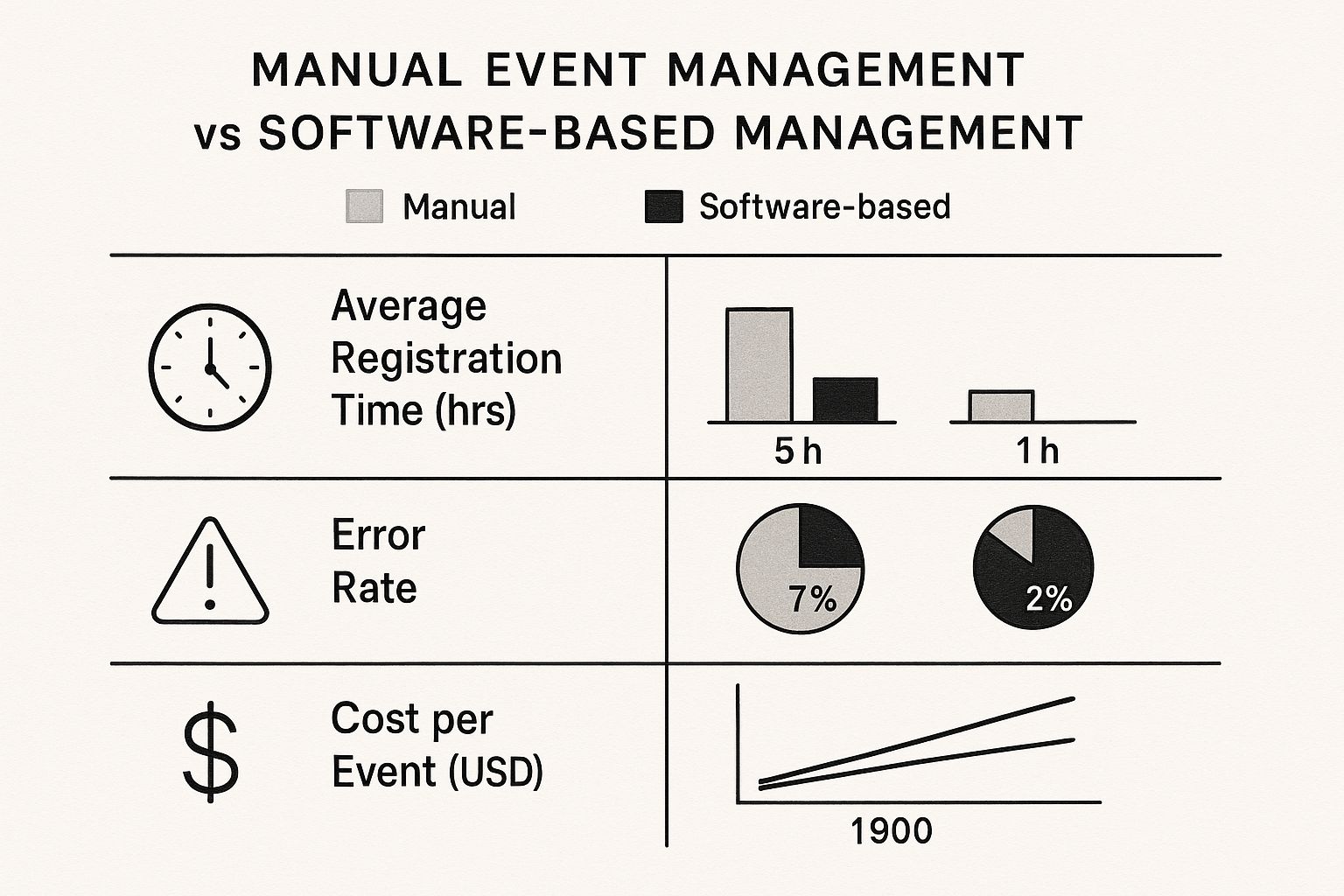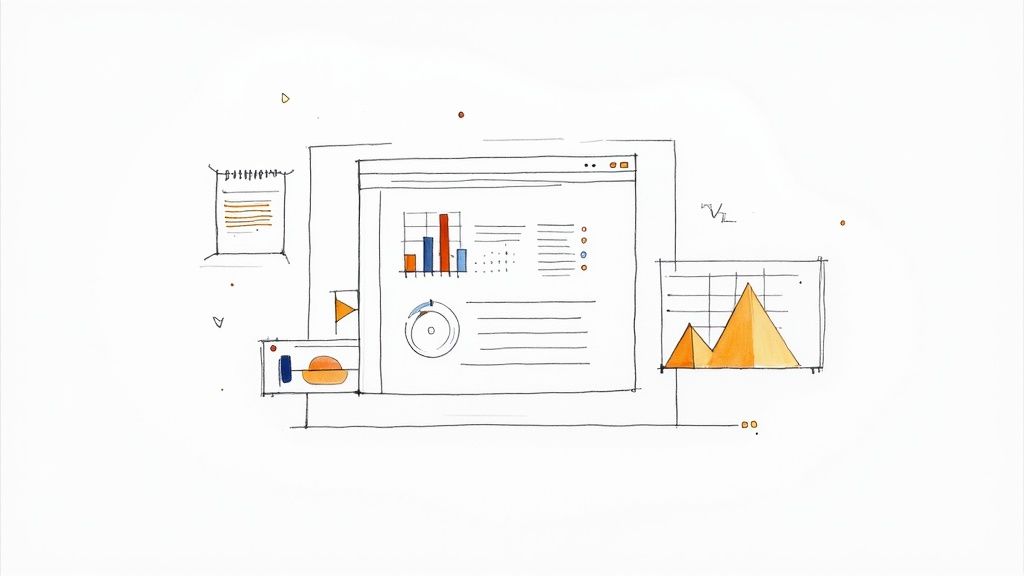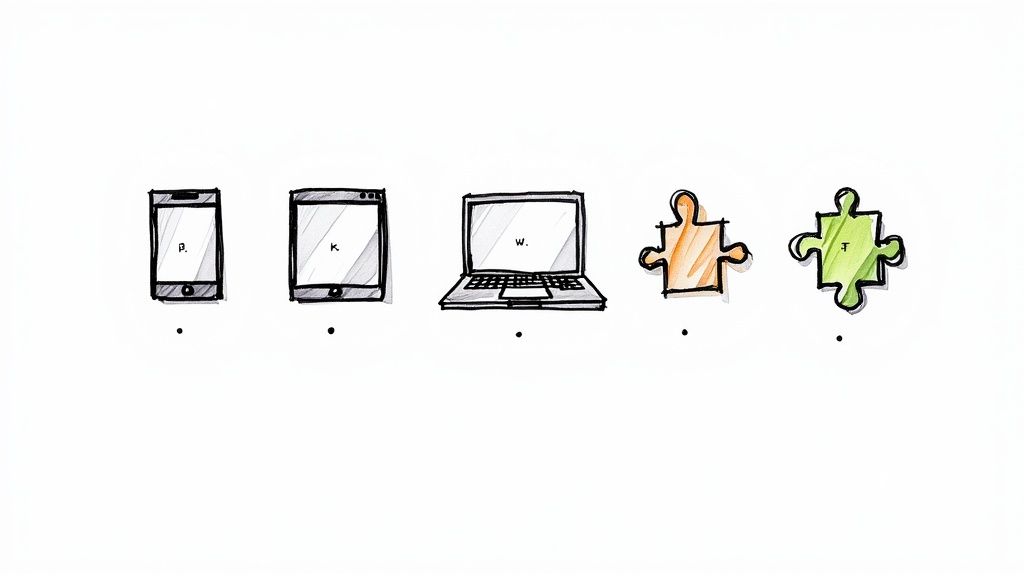August 28, 2025

At its heart, event management software is your command center for bringing any event to life. It’s a dedicated tool designed to plan, run, and measure the success of everything from a small workshop to a massive conference.
Forget juggling endless spreadsheets, sifting through chaotic email chains, and manually tracking every little detail. This software pulls all those scattered pieces into one organized, streamlined system. Think of it less like a simple tool and more like your expert co-pilot, making sure every part of the event—from registration to post-event feedback—works together seamlessly.
Not too long ago, planning an event felt like an exercise in organized chaos. You had one spreadsheet for the attendee list, another for the budget, and a third for the speaker schedule. You were using a separate payment tool for tickets and trying to manage promotion across a dozen different communication channels.
This old-school, manual approach was a recipe for headaches. It wasn't just tedious; it was a minefield of potential errors. Double-booked rooms, lost registration data, and a clunky, confusing experience for attendees were all common side effects.
The whole point of event management software is to bring all those jobs under one roof. Instead of wrestling with a handful of different tools that refuse to talk to each other, you get a single source of truth for your entire event.
This shift from a collection of tools to a single platform is what separates simply managing an event from truly orchestrating it. The software takes on the heavy administrative lifting, which frees you up to focus on creating an experience that people will actually remember.
The numbers tell the story. The global market for this software was valued at USD 6.63 billion in 2024 and is expected to rocket to USD 13.4 billion by 2033. Why the massive growth? Because event organizers everywhere are demanding better ways to automate tasks, get real-time data, and seamlessly run virtual and hybrid events.
This image really drives home just how much more efficient a software-based approach is compared to doing things the old-fashioned way.

The data shows a huge drop in time spent on admin tasks and a major reduction in errors. It’s clear proof of how this software immediately boosts efficiency and saves money.
To help illustrate the difference, let’s compare a few common event tasks side-by-side.
This table makes it obvious: the right software doesn't just make your job easier—it makes it smarter.
Ultimately, understanding event management software means seeing it as a strategic tool, not just an administrative one. It automates the grunt work, delivers powerful insights, and improves the experience for you, your team, and your attendees. For example, concepts from modern office visitor management systems are being adopted to create a smoother, more secure check-in process for events of all sizes.
By centralizing everything, these platforms empower teams to achieve more with less effort. You can learn more by exploring our comprehensive guide on https://groupos.com/blog/event-management-software for tips on getting the most out of your workflow.

To really get what event management software is all about, you have to look under the hood. It’s the specific tools inside that turn a potentially chaotic process into a well-oiled machine. These core features are the building blocks for any successful event, each one designed to solve a real-world problem that planners face every single day.
Think of it like a specialized crew on a film set. You have experts for sound, lighting, and cameras. Each has a distinct job, but they all work from the same script to create a seamless final product. That integrated approach is what makes modern event execution not just possible, but powerful.
The very first interaction anyone has with your event is registration. A clunky, frustrating process can make people give up before they even start. Good software transforms this crucial step from a manual headache into a smooth, automated experience for your attendees.
Forget about tracking sign-ups in a spreadsheet. Now, you can build branded, custom registration forms in minutes. These forms can automatically handle complex stuff like different ticket tiers, early-bird pricing, and discount codes without you lifting a finger.
The real magic is in the automation. Once an attendee signs up, the software instantly processes their payment, shoots them a confirmation email with a unique QR code, and updates your attendee list in real time. That single, smooth workflow saves countless hours of admin work.
Getting the word out is obviously critical, but just blasting generic emails to everyone doesn't cut it anymore. Modern platforms come with built-in marketing tools that let you talk to your audience with precision. You can segment your contact lists and send personalized messages that actually resonate.
For example, you could craft one email campaign for people who've already registered, reminding them of key sessions, and a completely different one for prospective attendees that highlights your star speakers. Many platforms even offer features similar to the best social media management tools to boost your event's visibility and get people talking.
This kind of communication is also fundamental to building a community. By keeping everyone informed and engaged before, during, and after the event, you forge a much stronger connection. To dive deeper into this, check out our guide on https://groupos.com/blog/7-core-community-manager-responsibilities-for-2025.
Keeping an audience captivated, especially during a long conference or a virtual session, is a huge challenge. Event management software gives you a toolkit to turn passive listeners into active participants.
These tools are usually bundled into a dedicated mobile event app, which becomes the go-to hub for every attendee. Here’s what you can typically do with it:
How do you really know if your event was a success? In the past, it was a lot of guesswork and digging through different spreadsheets. Today’s software puts a centralized dashboard with real-time analytics right at your fingertips.
From this one screen, you can track all the important metrics:
This data is gold. It helps you make smart decisions on the fly during the event and, just as importantly, lets you prove your event's ROI to stakeholders afterward. You get the hard evidence needed to fine-tune your strategy, making every future event even better than the last.

It’s one thing to list out the features of event management software, but it’s another thing entirely to see the impact it has in the real world. This isn't just about adding another tool to your tech stack. It’s about a fundamental shift in how you plan and execute events—moving from a constant state of putting out fires to strategically building something great.
The benefits aren’t just theoretical; they touch every part of the event lifecycle. You’ll see a difference in your team's sanity, your attendees' happiness, and your organization's bottom line.
Think about all those hours spent manually checking off names on an attendee list, reconciling payments, or sending one-off confirmation emails. Now, picture getting all that time back. That’s the first, and often most profound, benefit you'll feel.
At its heart, what is event management software? It's a system designed to automate the monotonous, time-sucking tasks that bog down every event planner. Instead of getting lost in a sea of spreadsheets, your team gets to focus on what they do best: creating unforgettable experiences.
This automation works like a tireless digital assistant, handling crucial workflows around the clock without you lifting a finger. For planners, this means less administrative headache and a massive jump in productivity.
By automating routine jobs like registration confirmations and payment processing, you give your team the bandwidth to focus on strategic planning and attendee engagement. That’s where the real magic happens.
With this newfound freedom, you can finally think bigger. You can spend more quality time finding the perfect keynote speaker, designing a networking session that actually works, or crafting content that leaves a lasting mark on your audience.
In the old days, event data was a mess—scattered across email threads, countless spreadsheets, and different payment gateways. This chaos didn't just create more work; it made it almost impossible to get a clear, up-to-the-minute view of how your event was actually doing.
Centralization brings all that scattered information into one place, creating a single source of truth. Every bit of data, from registration numbers to which breakout session is the most popular, lives on one clean dashboard. This brings some huge advantages:
This central hub gives you the power to answer critical questions instantly. Curious which social media campaign is driving the most ticket sales? The data is right there. Need to know if you should add more chairs to a specific session? A quick glance at the dashboard gives you your answer.
At the end of the day, an event’s success is judged by the experience it provides. A smooth, professional, and engaging journey can turn a first-time attendee into a lifelong fan of your brand. This is where event management software really shines, improving every single touchpoint.
It all starts with a simple, hassle-free online registration. From there, it continues with personalized communication, like agenda reminders and event updates pushed through a mobile app. During the event itself, features like interactive maps, live Q&A, and easy-to-use networking tools keep people engaged and connected.
This obsessive focus on the user experience pays off big time. When attendees feel like you've thought of everything and can easily navigate the event, their satisfaction skyrockets. That not only builds a stellar reputation but also makes it far more likely they'll come back next time—a clear and measurable return on your investment.

The idea that one piece of software could handle every type of event is a myth. The real magic of modern event management software is its incredible adaptability. It’s like a chameleon, shifting its features to match the specific needs of any gathering you can dream up.
Whether you're organizing a massive corporate trade show or an intimate nonprofit fundraiser, the right platform gives you the exact set of tools to solve that event's unique challenges. Think of it less like a rigid program and more like a modular toolkit. You pick and choose the tools you need for the job at hand.
This kind of flexibility is exactly why the industry is exploding. The market for these platforms is projected to jump from around USD 17 billion in 2025 to an incredible USD 82.3 billion by 2035. This isn't just a trend; it's a fundamental shift in how events are planned and executed, driven by the need to manage complex hybrid formats and prove a solid return on investment. You can dive deeper into this growth on Future Market Insights.
When you're dealing with big corporate events, the game is all about lead generation, professional networking, and making a powerful brand statement. Here, event management software isn't just an organizational tool—it's a business intelligence powerhouse.
The features that really count for these large-scale events are the ones that tame complexity and deliver actionable data:
For a corporate planner, this means seamlessly creating personalized agendas for thousands of people. For an exhibitor, it means using the mobile app to follow up with a hot lead just minutes after a handshake.
Nonprofit events run on a totally different engine. The main goals here are to inspire generosity, connect with the community, and share a powerful mission. So, the software has to be built for fundraising and forging emotional connections.
In this world, the must-have features are:
This is where the software lets a nonprofit sell out its annual gala, run a silent auction, and push a live donation appeal, all through one cohesive system.
The beauty of modern event software is its range. A single platform can be configured to capture a sales lead at a tech conference on Tuesday and then process a life-changing donation at a charity gala on Saturday. It’s all about matching the right features to the event’s core mission.
Hybrid events, with their mix of in-person and virtual audiences, are a whole different beast. The software’s job is to act as the bridge between those two worlds, creating one unified, seamless experience for everyone, no matter where they are.
This demands a platform that truly excels at:
From academic conferences connecting researchers across continents to music festivals streaming live sets to a global fanbase, event management software is the invisible backbone that holds these incredibly complex experiences together.
Walking into the world of event management software can feel overwhelming. There are so many options, and on the surface, they all seem to do the same things. It’s a busy market for a reason—industry experts predict the sector will balloon from USD 16.03 billion in 2025 to a staggering USD 36.12 billion by 2032. You can dig into the numbers yourself over at Coherent Market Insights.
This explosion of choice is great, but it also means you need a game plan. Think of picking software less like shopping and more like hiring a new team member. You need the right fit for your budget, your goals, and your future.
Before you get dazzled by product demos and feature lists, take a step back and look at your own process. What are the things that drive you crazy right now? Where do things consistently fall apart?
Map out your entire event workflow, from the first promotional email to the final thank-you note. Pinpoint the bottlenecks. Is it the nightmare of manually tracking registrations? The struggle to keep attendees engaged? The headache of proving your event’s value to stakeholders?
Your answers become your non-negotiable feature list. Forget the flashy bells and whistles for a moment and focus on what will actually make your life easier. For many, a smooth, easy-to-use registration system is at the top of the list. Our guide on the 12 best event registration form templates for 2025 can give you a good idea of what an excellent setup looks like.
To help you get organized, here’s a checklist you can use to compare different platforms. It separates the absolute essentials from the features that are great but not necessarily deal-breakers.
This checklist isn't exhaustive, but it provides a solid framework. Adjust it to fit your specific needs, and you'll have a much clearer picture of what you're looking for before you even talk to a salesperson.
The software that works for your 50-person workshop today needs to be able to handle your 500-person conference next year. Look for a platform that can grow with you. Does it offer different tiers or plans? How easily can you add more users, events, or attendees without breaking the bank?
Just as important is how well it plays with your other tools. Your event software can't live on an island; it has to talk to your CRM, your email platform, and your accounting software.
A platform's true power is often revealed by how well it plays with others. Seamless integration with your CRM, email marketing service, and accounting software is not a luxury—it's essential for creating a unified data ecosystem and avoiding manual work.
Make a quick list of the software you rely on every day. Any potential event platform must be able to connect with those critical systems. Otherwise, you're just signing up for hours of manual data entry and frustration.
All the features in the world mean nothing if your team hates using the software. A confusing, clunky interface is a recipe for disaster. It leads to low adoption, wasted time, and a whole lot of buyer's remorse. The right tool should feel intuitive, not like you need a PhD to figure it out.
When you're in a demo or a free trial, really pay attention to the user experience (UX). How many clicks does it take to do a simple task? Can you build a landing page without wanting to pull your hair out?
Get your whole team involved in the evaluation. The people who will be in the software every day are the best judges of whether it will be a help or a hindrance. Their buy-in is absolutely essential for making the switch a success.
It’s easy to get swept away by a polished sales pitch. Go into every demo armed with a list of specific, practical questions that get to the heart of what matters to you.
Here are a few to get you started:
Asking tough questions like these helps you see past the marketing and understand what it would truly be like to work with this company. It’s the final check to ensure you’re making a smart choice that will pay off for years to come.
The world of event management software never sits still. We're constantly seeing new tech that promises to make our events more personal, immersive, and downright intelligent. The tools we rely on today are fantastic, but they're really just the foundation for what's coming next—a future driven by data and a genuine desire for deeper connections with our attendees.
At the heart of this change is Artificial Intelligence (AI). It's quickly evolving past basic automation to become a true strategic partner for event planners. Picture an AI that doesn't just send emails but analyzes attendee behavior to suggest the perfect session schedule for each person. Or imagine it optimizing event logistics on the fly, rerouting foot traffic to avoid bottlenecks. That's where we're headed.
It's not just the software that's getting smarter; the venues are too. The rise of the Internet of Things (IoT) means physical spaces can finally "talk" to your event platform. Smart sensors, for instance, could alert your team when a breakout room is almost full or automatically adjust the thermostat based on how many people are in the room. This makes the entire experience more responsive and comfortable for everyone involved.
We're also seeing a huge push toward creating truly blended event realities:
The goal isn't just about managing an event anymore. It’s about creating a living, data-rich environment that elevates every single moment for attendees, whether they're in the room or joining from halfway across the world.
Pulling this off requires a solid grasp of how all these different technologies can work in harmony. As platforms get more powerful, integrating your tools becomes non-negotiable. For example, applying principles from marketing automation for agencies can show you how to effectively nurture your audience and communicate with thousands of attendees in a personalized way.
Looking forward, the biggest trends will revolve around creating hyper-personalized and sustainable events. With data privacy and environmental impact becoming top priorities, the next generation of software must offer robust tools for compliance and for tracking an event's carbon footprint. It’s all about building a future-proof strategy.
Diving into event technology can feel a little overwhelming at first. To help you out, I've put together some plain-English answers to the questions I hear most often from people who are just starting to explore event management software.
At its heart, event management software is designed to bring order to the chaos. Its main job is to centralize and automate every single step of the event planning process. Think of it as swapping your messy collection of spreadsheets, sticky notes, and email chains for a single, organized dashboard.
This means all your crucial information—from who's coming to how much money you've made—lives in one spot. Then, the automation kicks in, handling all the tedious but necessary tasks like sending out confirmation emails, chasing up payments, or collecting feedback afterward. The real goal here is to get you out of the administrative weeds so you can focus on what actually matters: creating an amazing experience for your attendees.
The price tag on event management software can be all over the map, but most companies stick to a few common pricing models. Figuring out which one works for you is key to finding a tool that fits your budget.
Here’s a quick breakdown of what you’ll likely see:
Not at all. While it's easy to picture this kind of software powering huge corporate conferences, it's a game-changer for small businesses and organizations. Today’s platforms are built to scale, with many offering affordable plans that give you access to the same powerful tools the big players use.
For a small business, this software levels the playing field. It allows a small team to execute a polished, professional event that would otherwise require significantly more staff and resources, directly improving efficiency and enhancing brand perception.
By helping you automate registration, communicate more effectively, and see exactly what's working, even the smallest operation can run a smoother event, boost attendance, and deliver an experience that makes you look like a seasoned pro.
Ready to see how an all-in-one platform can transform your events and community management? GroupOS provides all the tools you need to manage registrations, memberships, and content in a single, branded solution. Start your free trial today and experience the difference.


